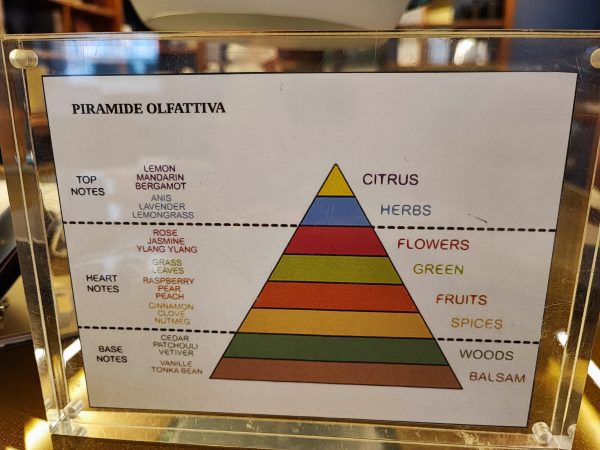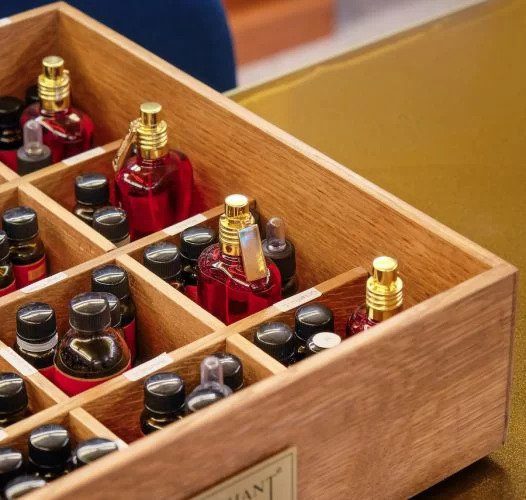I’ve never been much of a perfume girl, but that’s not because I’m unaware of scent. The smell of roses and lavender remind me of my grandmothers. My mom favored spicy perfume when I was a kid. And since I grew up in the 1980s, Drakkar Noir cologne–which I can’t believe is still on the market–instantly takes me back to junior high and high school dances in the gym and awkward teen boys in Z Cavaricci jeans, not to mention my early 1990s club days in Philly, frantically attempting to repel South Jersey guys who smelled like they bathed in the stuff. Scent is memory–important to a writer!
Hey, I wore Love’s Baby Soft as a preteen. Who didn’t? I remember getting that special gift set of the perfume and lotion for Christmas. I even flirted with wearing Anais Anais for a year or two, which strikes me as strange, given the base notes of incense, musk, leather, and patchouli–all smells that aren’t my favorite. Luckily, no matter how much of a perfume I put on, my skin doesn’t seem to hang onto it. It’s there and gone. But that’s probably also the reason why I’ve not worn perfume much as an adult. I know what I like–vanilla and citrus–but braving the perfume section at a Macy’s or trial-and-erroring at Sephora… I don’t know, it just seems like a lot of effort for something that’s not going to give a lot of payout.
I do have one perfume–Ribello, a perfume based on citrus trees grown at the Vatican. It’s from Essenzialmente Laura, a perfumerie launched by a professional Italian “nose.” I thought maybe that would be the extent of my return to perfume. I mean, it’s not like I’m in public much: I work from home, and when I do leave my house it’s mostly to head to the gym. No one wants to be around a sweaty girl who faintly smells of the Pope’s citrus, you know? But then I decided I was going to spend a few days in Venice this May to celebrate graduating from my masters program–and The Merchant of Venice holds perfume workshops. I was going to Venice solo, so I didn’t need to worry about planning things my husband would want to do, too, so… why not?
 The first thing Joan Giacomin–the brand ambassador for The Merchant of Venice, a Venetian “nose” and make up artist, and the workshop educator–asked during our workshop: “Are you passionate about perfume?” Er, no. No, I am not. But I’m curious… and as a writer it makes sense to understand as much as I can about scent. The workshop, held in a small room on the second floor of the Studium book store off San Marco Square, is two hours long. During the first half Joan takes you through half a dozen-ish historical periods, talks about the role of perfume during those periods, and you smell three scents associated–singly and then together. This is how I discovered the following:
The first thing Joan Giacomin–the brand ambassador for The Merchant of Venice, a Venetian “nose” and make up artist, and the workshop educator–asked during our workshop: “Are you passionate about perfume?” Er, no. No, I am not. But I’m curious… and as a writer it makes sense to understand as much as I can about scent. The workshop, held in a small room on the second floor of the Studium book store off San Marco Square, is two hours long. During the first half Joan takes you through half a dozen-ish historical periods, talks about the role of perfume during those periods, and you smell three scents associated–singly and then together. This is how I discovered the following:
- In Ancient Rome, doves were soaked in scented oils so that when released they would spread scent over parties: doves, the original air freshener, I suppose.
- Also in Ancient Rome, there were certain scents that were traditionally applied to specific body parts. Like white thyme essential oil was only to be applied to the leg below the knee.
- Olibanum is a type of frankincense that was a common scent in Ancient Rome–that is today part of the scent of Coca-Cola (probably the synthetic version since the trees were olibanum come from are becoming endangered).
- Because of scent being so strongly tied to religious rite and medicine, early perfumers were strongly connected to both.
- Apparently muscenone (a synthetic musk that is also a fragrance enhancer) cannot be smelled by people who lack the correct genetics–so if you’re missing that ability genetically, one cannot be a perfumer.
- In Florence a famous perfumer was also an astrologer and poisoner, which weirdly makes so much sense.
- The top note of a perfume is what you smell first and often lasts for 5-20 minutes, followed by the heart note–it disperses after the top note wears away and lasts for around 30 minutes. The base notes kick in after that and give a perfume it’s longevity.
- On average, a parfum contains 20-40% concentration of essences diluted in ethyl alcohol and will stay on the skin for up to eight hours, while on the other end of the spectrum an eau fraiche has 1-3% concentration and will last for less than two hours.
- I love the smell of violet leaf.
- I’m the only one who has taken Joan’s class that knows patchouli is popular as a scent because it masks other scents. I loathe the smell of patchouli.
- When you have smelled too many things and your nose is overloaded/tired, rub the inside of your forearm to warm the skin, then smell your forearm–it refreshes your nose. I had to do it a lot toward the end of the workshop, and it totally works!
 I mean, yes, I learned a ton from Joan’s class, and that’s worth it–but the best part comes during the second half of the workshop: Joan sits across from you and hands you testing strips dipped in scent… and all you have to do is say “yes, I like it” or “no, I don’t like it.” That’s how she custom formulates a perfume just for you!! But first she smells your arm to determine what kind of skin you have, and apparently this is why perfume doesn’t stay on me for very long–I have what she calls “dry” skin, but which apparently is not what is traditionally considered dry skin. Whatever the case, she takes that into consideration in the formulation. And I promise you that after I sprayed my wrist with my new perfume, I could still easily smell it the next morning. That, to me, is the best reason to take the workshop because that right there? That’s magic. And did I mention that she’s willing to make up a new batch whenever you need it? I visit Venice every other year for the art biennale, so I’m pretty sure a new batch of perfume is going to be tacked on as part of the tradition.
I mean, yes, I learned a ton from Joan’s class, and that’s worth it–but the best part comes during the second half of the workshop: Joan sits across from you and hands you testing strips dipped in scent… and all you have to do is say “yes, I like it” or “no, I don’t like it.” That’s how she custom formulates a perfume just for you!! But first she smells your arm to determine what kind of skin you have, and apparently this is why perfume doesn’t stay on me for very long–I have what she calls “dry” skin, but which apparently is not what is traditionally considered dry skin. Whatever the case, she takes that into consideration in the formulation. And I promise you that after I sprayed my wrist with my new perfume, I could still easily smell it the next morning. That, to me, is the best reason to take the workshop because that right there? That’s magic. And did I mention that she’s willing to make up a new batch whenever you need it? I visit Venice every other year for the art biennale, so I’m pretty sure a new batch of perfume is going to be tacked on as part of the tradition.
So what do I smell like these days? It’s a citrus-heavy scent. Bergamot top notes with heart notes of petitgrain and neroli and base notes of tonka bean, vanilla, and vetiver. Come smell me at the next in-person event, which I realize is a weird thing to say, but Joan has totally turned me into a perfume girl.

